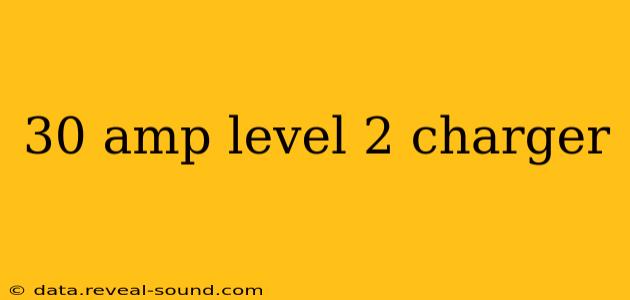The transition to electric vehicles (EVs) is accelerating, and with it, the demand for reliable and efficient Level 2 chargers. A 30-amp Level 2 charger is a popular choice for home and workplace charging, offering a balance between charging speed and cost. This guide delves into the intricacies of 30-amp Level 2 chargers, addressing common questions and providing valuable insights for potential buyers.
What is a 30 Amp Level 2 EV Charger?
A 30-amp Level 2 EV charger is a device that uses a 240-volt circuit to charge electric vehicles significantly faster than a standard Level 1 (120-volt) charger. The "30-amp" designation refers to the maximum amperage the charger can draw from your electrical system. This higher amperage translates to a quicker charging rate compared to lower amperage Level 2 chargers. While not the fastest available, a 30-amp charger strikes a good balance between speed and the electrical capacity typically found in most homes.
How Fast Does a 30 Amp Level 2 Charger Charge?
The charging time with a 30-amp Level 2 charger varies considerably depending on the vehicle's battery capacity and onboard charging system. Generally, you can expect to add approximately 25-40 miles of range per hour of charging. However, it's crucial to consult your vehicle's owner's manual for precise charging rate specifications. Factors like ambient temperature and battery state of charge can also impact charging speed.
What are the Advantages of a 30 Amp Level 2 Charger?
- Faster Charging: Compared to Level 1 chargers, a 30-amp Level 2 charger significantly reduces charging time, making it a practical option for daily use.
- Cost-Effective: While faster than Level 1, 30-amp chargers are generally more affordable than higher-amperage options like 40-amp or 50-amp chargers.
- Wide Compatibility: Most EVs are compatible with 30-amp Level 2 chargers, although checking your vehicle's manual to confirm compatibility is always recommended.
- Home Installation Feasible: A dedicated 30-amp circuit is usually achievable in most homes without major electrical upgrades, making it a convenient option for home charging.
What are the Disadvantages of a 30 Amp Level 2 Charger?
- Not the Fastest: Higher amperage chargers exist, offering even faster charging times. If you need to charge your EV very quickly, a 30-amp charger might not be sufficient.
- Circuit Requirements: You'll need a dedicated 240-volt circuit installed by a qualified electrician, which may incur costs.
Do I Need a Dedicated Circuit for a 30 Amp Level 2 Charger?
Yes. A 30-amp Level 2 charger absolutely requires a dedicated 240-volt circuit. Sharing a circuit with other appliances can overload the wiring and potentially cause electrical hazards. This dedicated circuit must be installed by a licensed electrician to ensure safety and compliance with electrical codes.
What is the Difference Between a 30 Amp and 40 Amp Level 2 Charger?
The primary difference lies in the charging speed. A 40-amp charger delivers more power, resulting in faster charging times. However, this requires a higher amperage circuit, potentially necessitating more significant electrical upgrades in your home or workplace. The 30-amp option is a good compromise for many EV owners seeking a faster charge without excessive electrical work.
How Much Does a 30 Amp Level 2 Charger Cost?
The cost of a 30-amp Level 2 charger can vary depending on the brand, features (like smart features or integrated connectivity), and any installation costs. Expect prices to range from a few hundred dollars to over a thousand dollars, depending on these factors. Remember to factor in the cost of professional installation by a qualified electrician.
How to Choose the Right 30 Amp Level 2 Charger?
Choosing the right charger involves considering your specific needs and preferences. Factors to consider include:
- Charging speed: While all 30-amp chargers will be faster than Level 1, there will still be minor variations.
- Features: Some chargers offer smart features like scheduling, energy monitoring, and app connectivity.
- Installation requirements: Ensure the charger is compatible with your existing electrical setup.
- Budget: Set a budget and stick to it. Compare prices from different retailers and brands.
- Warranty and customer support: Look for a reputable brand with a good warranty and responsive customer support.
By carefully considering these factors, you can select a 30-amp Level 2 charger that perfectly suits your EV charging needs.
